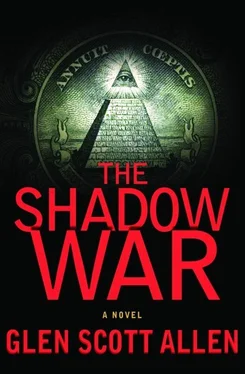Glen Allen - The shadow war
Здесь есть возможность читать онлайн «Glen Allen - The shadow war» весь текст электронной книги совершенно бесплатно (целиком полную версию без сокращений). В некоторых случаях можно слушать аудио, скачать через торрент в формате fb2 и присутствует краткое содержание. Жанр: Триллер, на английском языке. Описание произведения, (предисловие) а так же отзывы посетителей доступны на портале библиотеки ЛибКат.
- Название:The shadow war
- Автор:
- Жанр:
- Год:неизвестен
- ISBN:нет данных
- Рейтинг книги:5 / 5. Голосов: 1
-
Избранное:Добавить в избранное
- Отзывы:
-
Ваша оценка:
- 100
- 1
- 2
- 3
- 4
- 5
The shadow war: краткое содержание, описание и аннотация
Предлагаем к чтению аннотацию, описание, краткое содержание или предисловие (зависит от того, что написал сам автор книги «The shadow war»). Если вы не нашли необходимую информацию о книге — напишите в комментариях, мы постараемся отыскать её.
The shadow war — читать онлайн бесплатно полную книгу (весь текст) целиком
Ниже представлен текст книги, разбитый по страницам. Система сохранения места последней прочитанной страницы, позволяет с удобством читать онлайн бесплатно книгу «The shadow war», без необходимости каждый раз заново искать на чём Вы остановились. Поставьте закладку, и сможете в любой момент перейти на страницу, на которой закончили чтение.
Интервал:
Закладка:
She wasted a full hour looking through the archives of the newspaper Borba, searching for any mention of tenyu. But most of the archived material was either numbingly routine or the raving paranoid fantasies that passed for commentary during those dark, suspicious years: articles about Americans needing to buy their oxygen from vending machines, being thrown out of the windows of hospitals for not paying their bills… amusing stuff, but hardly Cold War intrigue.
She sensed this was a wild-goose chase, as the Americans put it-though she'd never been able to understand why the goose had to be wild; was there such a thing as a tame goose? Did early Americans keep such geese as pets, teach them tricks, put them in circuses, like Russians with their bears?
There was so much cultural history beneath almost every colloquialism-so much meaning that was simply taken for granted-it sometimes astounded her that people from two different cultures could communicate at all. And then sometimes, too, she wondered if they ever truly did.
She thought back to her one brief affair with an American. He'd been a speechwriter for the White House. She remembered one very early morning in particular, a discussion that had seemed unimportant at the time, but had by now become a symbol for the cultural gulf between them.
They'd been lying in bed after making love, smoking, the ashtray set on the gold satin sheet-she brought them out especially for his visits-when he'd started complaining about his job.
"It's difficult to keep coming up with phrases that say much but mean nothing."
She'd smiled. "Mr. Gorbachev was a master at such speech. We called it sotryasat vozdukh, shaking the air."
"Well, he's much admired in this country," said her lover, exhaling smoke.
"And hated in Russia," said Natalya.
He had suddenly grown serious. "The Soviet Union was rotten to the core. It had to collapse. He was just trying to limit the damage."
"And of course the Americans did not benefit from this 'damage control.' "
He sighed. "There you go again, with those paranoid theories. Did you ever consider that sometimes there is no plot? Sometimes, as we say, shit happens?"
And sometimes, she'd thought, shit very conveniently happens. But she hadn't said anything, not wanting to start another argument.
And eventually it was such arguments that ended the affair.
To her mind, most Americans were naive children, playing at world politics as though the Bad Guys always wore black hats, like in their cowboy fairy tales. Growing up during Soviet times, even in their sunset years, had taught her that enemies were not always so clearly identifiable; that, more often than not, the hats they wore were gray, not black.
"Gray Cardinals" they were called in her culture; the true power that stood always behind the throne, whispering into the ears of those seemingly in charge, all the while remaining invisible.
The faint bluish glow of the computer screen suddenly seemed irritating, her eyes unable to focus on the multicolored symbols.
Natalya leaned back and stretched, trying to work some of the tension out of her back. No one had returned to work in the last hour. Apparently the weekend staff was taking a more traditionally Soviet lunch break. She remembered what a friend had said of those days: "We pretend to work, and they pretend to pay us."
She walked out of the small glass-walled office, saw no one, then wandered over to the window and gazed out on Wisconsin Avenue. Even on a Saturday it was filled with taxicabs and heavy traffic. She looked up to the clear blue sky, a crisp early fall day. The row of maple trees across Wisconsin were crowned in fall colors, the distant pinnacle of the Washington Monument a stark intrusion into the cloudless sky.
The scene made her want to give up the search now and leave, perhaps walk over to the Mall, visit the Lincoln Memorial, a diversion she always found refreshing. There was something so comforting, yet so tragic, in that immense statue's face that she always felt both inspired and humbled in its presence.
Of course tragedy was something Russians knew a great deal about. In fact, she'd often thought that was what most mystified Americans about her countrymen: their ability, even their need, to treat sadness as an emotion like any other, as something necessary to life, like joy or determination. She'd voiced that idea once to a counterpart in the American embassy, and he'd replied, "Oh, I see. So Russians aren't happy unless they've got something to be depressed about?"
Perhaps there was something to that. She felt in her own heart the need to know and appreciate both sides of her emotions, both the light of pleasure as well as its shadow.
And at that thought her mind suddenly went back to her search. So far she'd been focusing on the word borba. What if she took tenyu, "shadow" or "shade"-there was really no distinction in Russian-as the key?
With renewed energy she went back to her desk. She sat down and immediately began typing.
And immediately she got a hit: another film, this one titled Боu с mен b ю (Boy s tenyu). But it wasn't the film itself that had caught her attention, it was the English translation of the title.
Shadow Boxing.
"Shadow boxing" made a lot more metaphorical sense than "fighting with shadows" or "warring with shade."
Or did it?
After all, besides fighting and struggle, borba could just as easily be interpreated as "war." Borba s tenyu. Warring with shadows? Or, given that the word "warring" didn't exist in Russian, what about the simpler version?
Shadow war.
It occurred to Natalya she should scour the archives for a Russian book that had been translated into English as Shadow War, regardless of its original name in Russian.
She glanced out the window and saw that the outside light was fading as evening approached. Her second wind of curiosity was wearing off. But she had time for one more attempt.
She tapped at the keyboard until English Title = Shadow War was glowing in green letters on her screen. She hit Return.
Immediately there was a result. At first she was surprised by what she read; but then she realized it confirmed her first intuition.
Досmуn в архuв огранuчен read the screen.
Restricted archives.
In bright red letters. Blinking bright red letters.
"Everything all right, Natalya Nikolayevna?"
The voice startled her. She looked up to see one of the guards standing in the doorway. He looked quite threatening in his gray-and-olive camouflage uniform, a small pistol strapped at his waist.
"Yes. Just working." She smiled, and shifted so her shoulders would cover the computer screen.
"On a beautiful Saturday afternoon?" said the guard. "A pretty woman like you should be out enjoying herself, not cooped up in this mausoleum with an old fossil like me."
"Is there a problem?" she asked somewhat curtly. She didn't want him to linger long enough to become curious.
He looked confused. "No, of course not. I just-"
"I am very busy," she said.
He nodded. "Of course." He decided to counter her frostiness by asserting his authority. "But be certain to sign out when you leave. In these days-"
"I will." Now she smiled, hoping that would satisfy him. "You have my word."
He nodded at her, continued on his rounds.
She turned back to the computer screen. The red "Restricted Archives" message was still blinking. She canceled it out, then began filling out the form on the screen that would submit a request for access to the restricted archives; permission that could only come from the Ministry of Internal Affairs, but which would really come from the FSB. Which could take anywhere from a week to forever.
She thought of Yuri. Now she would definitely have to accept that dinner invitation.
Читать дальшеИнтервал:
Закладка:
Похожие книги на «The shadow war»
Представляем Вашему вниманию похожие книги на «The shadow war» списком для выбора. Мы отобрали схожую по названию и смыслу литературу в надежде предоставить читателям больше вариантов отыскать новые, интересные, ещё непрочитанные произведения.
Обсуждение, отзывы о книге «The shadow war» и просто собственные мнения читателей. Оставьте ваши комментарии, напишите, что Вы думаете о произведении, его смысле или главных героях. Укажите что конкретно понравилось, а что нет, и почему Вы так считаете.












